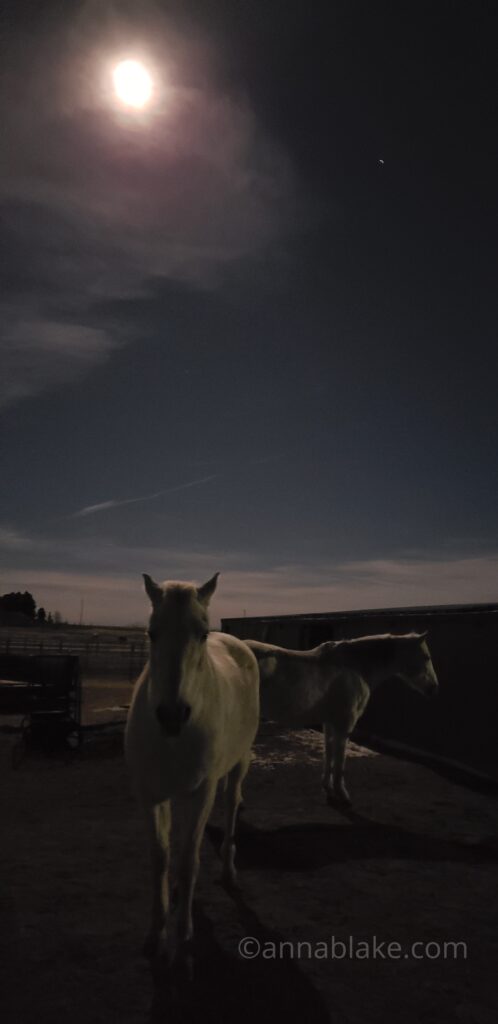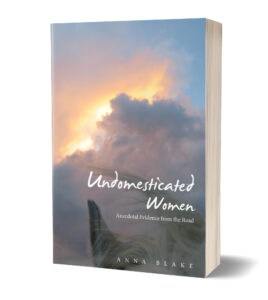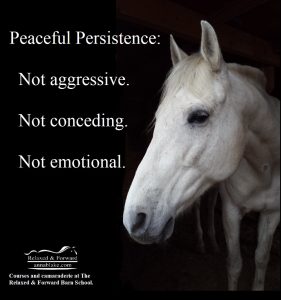
There is a recent article in the NYT about the culture wars going on in dog training that’s worth reading. (Click here.) The two sides agree on one thing: their side is right, and the other is wrong. The only winner is social media, where wildfire destruction is good business. It says something about dog training, which is also a contested topic in horse training, even if our vocabulary is slightly different.
For the most part, this war is fought with surrogates. To my cynical eye, too often the people with the confidence to train with kindness also have the confidence to own small dogs. Somehow there is this inverse balance, where others who want to be seen as tough show it by being tough on bigger dogs, (or maybe they are just a bit afraid of their dogs.) Owners who don’t socialize their dogs and train harshly end up with a fearful dog on a chain in the yard. Those “dangerous” dogs are collateral damage, an acceptable loss, but the breed gets the reputation, not the owners.
Meanwhile, dogs of similar breeds work for us, as search and rescue dogs, airport security dogs, police dogs, and a dozen other jobs. Those trainers, whose dogs live in their homes with their kids, know you can’t scare a dog into being brave and submission isn’t the goal. The handlers and their dogs carry an enviable strength that is quiet and undeniable.
Next month, Preacher Man, my reactive corgi, will have been here for ten years. He has some habits that others think make him hard to live with, like non-stop barking and peeing in the house. I’m in an arranged marriage with this rescue who arrived one day as unsettled as a ground blizzard but with a heart too big to quit trying. The sad parts haven’t changed in a decade. He is still terrified each time I touch a broom. He nervously over-barks if two people stand and talk. Even now he goes too still, almost cringing if I come into our room without saying his name to announce myself.
Then in a twist, he relaxes under my office chair even though the wheels roll on him tearing out tufts of hair a few times a day, my feet accidentally booting him even more often. But it would be worse, he thinks, if he lost track of those feet. He has fatty tumors now, cloudy eyes, and quite a few teeth have been removed. We have jagged and sharp feelings for each other, but nothing I do can take his fundamental fear away. Will he live long enough to heal or will senility set in first? I don’t care if only his little body can rest.
That same culture war has been going on in horse training. Some riders believe the myth of domination, using aggression to train horses but then defensively going further to shame others not willing to fight their horses. Riders ready to rumble, every horse a challenge to their ego. Every dissident a heretic.
My clients hear that criticism as they set about rehabbing horses marked with shrapnel scars from harsh starts and failed battles. Some try to straddle the line by using dominance methods halfheartedly, torn between people they identify with and what they see when they look into their horse’s eyes. Others feel isolated by their kindness to animals.
I’m lucky to be able to work with the most frightened horse I’ve ever met, although others would describe him with worse words. This rescue horse came here the same year as the corgi, and I chip away, worried that if he outlives me, he’ll have to be killed and cremated with me. His worst scars aren’t visible, of course. He doesn’t like me, but I can halter him most days now. It’s the internal damage, the fear that never lets him breathe. Clients frustrated with their horse for needing time, when it’s been six months already, make me laugh. What we can’t heal, we learn to live with.
I try to avoid all mention of culture wars while working, but the horses bring it up even more than clients. People need to vent and ask questions that are related one way or another. We share stories about be name-called woo-woo, told we train like a girl as if that’s a bad thing. They say we ruin our horses when the horses came to us damaged. We know it’s futile to try to out-bully a bully. We were raised to fight horses but when we know better, we change. Now we’re on the front line of a culture war, not that we can remember enlisting.
The truth is we all have rescues, we know the damage done. But bullying animals, and then children, and then each other, is surely a path to ruin. Is it our predator nature to yearn to dominate forever, even fighting our housepets? How did kindness become political?
Probably not the holiday message you were expecting. European countries have folk tales about animals magically talking at midnight, some say on the Feast of Santa Lucia, others say Solstice or Christmas Eve. In those stories, animals speak, but not always kindly. Some animals take revenge and owners get their due for poor care or over-work, which does sound like a reason to cheer. Maybe it’s time to give fewer gifts, but send off more donations to animal welfare groups who struggle with compassion fatigue, as many of us do this time of year.
Pulling on my barn coat and gloves, I head to the barn to throw hay before bed. It’s Winter Solstice, the longest night of the year. The moon is waxing to full. I love the night for its supernatural quality. Squint and you can half-see generations of dogs years gone and every horse you ever knew, their memory as thick as breath in the cold. The Ghost Herd is much larger than those living with me now, but this year there is a high-pitched nicker from a horse finally finding his voice. I don’t answer him with sound but rather exhale and let the air rest so long that the safety of being in a herd returns to us. It’s a feeling richer than love but we have to slow down to let peace soak in. On this holiday that started in a stable, animals are still sending calming signals that they are no threat to us. A bittersweet message.
Please, throw some extra hay for the long darkness tonight. Extra hay for the horses who have walked on, for those yet to arrive, and for those who have none. Throw extra hay as an affirmation that we each play a part in making it all come right.
…
 Available Now! Undomesticated Women, Anectdotal Evidence from the Road, is my new travel memoir. Ride along with us on a clinic tour through 30 states, 2 oceans, and 14k miles with me and my dog, Mister. It is an unapologetic celebration of sunsets, horses, RV parks, roadkill, diverse landscapes, and undomesticated women. Available now at Amazon, Barnes and Noble, and signed copies from me.
Available Now! Undomesticated Women, Anectdotal Evidence from the Road, is my new travel memoir. Ride along with us on a clinic tour through 30 states, 2 oceans, and 14k miles with me and my dog, Mister. It is an unapologetic celebration of sunsets, horses, RV parks, roadkill, diverse landscapes, and undomesticated women. Available now at Amazon, Barnes and Noble, and signed copies from me.
…
If you or your horse appreciate what I write, please Subscribe to this blog or join us at The Barn School. To follow Bhim’s Training Diary, click here.

Want more? Become a “Barnie.” Subscribe to our online training group with affirmative demonstration videos, audio blogs, daily quotes, free participation in “group lessons”, and live chats with Anna. Become part of the most supportive group of like-minded horsepeople anywhere.
Anna teaches ongoing courses like Calming Signals and Affirmative Training at The Barn School, along with virtual clinics and our infamous Happy Hour. Everyone’s welcome.
Visit annablake.com to find archived blogs, purchase signed books, schedule a live consultation, subscribe for email delivery of this blog, or ask a question about the art and science of working with horses.
Affirmative training is the fine art of saying yes.
Just when I think you’ve written the loveliest post ever you write another one. And by the way I too have a horse who might be afraid to the end, four years in with me, and you helped me feel okay about that today.
Thanks, Jen. It’s only time spent with a horse. No loss.
And if we never learn it, still, the proof is out there. Kindness enlivens us while cruelty keeps us forever in that darkest night.
Such true words, Thanks, Linda
And again, the tears…I made it until the last paragraph. Making it all come right can be so simple sometimes. My friend gifted my mare with a fancy salt block that I took to her pasture yesterday. For at least 10 minutes she and her friend went at it in what looked like true ecstasy, while I breathed and smiled and listened to them smacking their lips.
I have a quote taped to by barn locker:
“A good horse needs very little. But he needs that very little a whole lot.”
Thank you Anna, for continuing to help me notice the beauty inside of everything, and that so often that little bit is more than enough.
We are like horses that way, great comment. Thanks Cathy
Absolutely beautiful quote – should be a billboard – but the ones who really really NEED to read it & understand it, sadly, wont.
I think your mare has landed in an exceptional place.
Maggie
To me, not only do the dominance trainers reveal their own insecurity, they also cause the behaviors that they then must correct (blaming the horse, of course!)
I love the sentence “How did kindness become political?”
They create a vicious circle that keeps them in business, all right. And I spend way too much time muttering that other sentence. Thanks Susan.
If there were ever such compassionate, meaningful & eloquent words written for animals, I’ve not seen them. Thank you Anna, for being such a courageous voice, advocating for those who have no voice or choice in this world. You give like-minded individuals the courage to speak up & out for that which we know is true. Maybe someday we will be the majority!
I hope that you and yours are richly blessed this holiday season and in the coming new year.
I think we are already the majority. The silent majority… thanks, and best wishes to you as well, Sueann
Yowsa, Anna. Best Winter holiday message I ever received. All the best, everyone, in the coming New Year.
Thanks, Lynell. Best wishes, I appreciate your comments over the year.
I went to the barn yesterday in the early evening. It was dark outside and the barn was closed and dark inside. Stepping in to feel for the light switch all you could hear was contentment. Peaceful munching on hay, peaceful breathing, the occasional shift of weight. It was glorious.
I got Buddy out of his stall and groomed him. He was quiet and sweet after a day of (very obvious) mud rolling and fun. Got the sticks and burs out of his mane and tail along with at least one acre of mud off. I started telling him about the solstice from a human’s perspective and then listened to his version from a horse’s perspective.
We walked into the arena and hung out for a few minutes while others began to show up. After a few deep sighs, we walked the aisle back to his stall where the solstice fairy had deposited a juicy apple while we were away. No words. Just peaceful, grateful savoring of the apple.
No words at our parting – just a heartfelt wish for a peace filled night and sweet hay for a bed.
Thank you, my friend. What a wonderful comment. Barns are the best place.
Yup – Barns ARE the best place. Just standing there and listening to the munching & crunching of comfortable horses? Best sound in the world. Boy, do I miss it.
The NYT article shouldnt surprise any of us – it was only a matter of time before the extremes on both sides moved in. This might be from my age prospective, but the internet has really radicalized an awful lot of people – sorry, but not a good thing.
And definitely, Anna this holiday message is the best ever – I agree with Lynell.
Hope you & Mister & all the rest of your “crew” have a very calm, quiet Christmas.
Your words are always moving. Every Christmas morning when I go to the barn early in the dark, I think how this is where it all started – in the quiet, in the sound of animals eating, in the scent of hay. Happy holidays from our barn to yours, with best wishes for every blessing in the coming year.
The blessing of doing chores keeps it all close. Thanks, Kaylene. Every best wish right back.
You’re the best. That’s all.
No. You are. (Thanks, Sherry.)
Words to live by this Christmas, Anna; thank you. Over the past several months we adopted three donkeys.
They are named Hope (the mother), Nader, her one-year-old son, and the new 6-1/2 month old, Be’en.
They all live in Nablus, Israel. They are all white. Helping Safe Haven for Donkeys treat and care for over
200 in Nablus, and others in the brick kilns, who work hard on the West Bank and now in Egypt,
has warmed our hearts and helped build new shelters and stock new mobile clinics for the care at all
three locations. And I think of the First Donkey and the original stable.
Barns should be a place of peace.
We love your words, Anna. Keep writing — you make a huge difference in this world and to the lives of those whom you touch
with your presence and your writing.
On dark, cold, winter nights, remember this…
Love, Nuala
Thank you, Nuala. Best wishes to you and your barn.
I look forward to your writings. I’ve had my share of “hard to love animals” and I have loved them all. Sometimes I find a truce works well and it amazes me how an animal gets it. I think I grow thru their foibles, the things that we can learn. Attempt at harsh training cannot lead to anything good for horse or rider and the rescues are the biggest puzzles.
We had a miniature schnauzer rescue who to the day she left this earth I could never take my belt off in front of her. Pretty clear what had happened to her. Lola was an AMAZING friend.
It isn’t hard to figure… Thanks Janet. A truce works even if they don’t get it, because we change.
So well-written, Anna. Thank you ! This is a perfect essay/blog for the holidays with your message of peace. Or at least that’s how I see it. Glad the most scared horse you know is finding his voice.
Thank you, Sarah. I always appreciate your comments. (It won’t surprise you that the voice has a “Hey, you!” quality to it.)
Excellently said.
Thank you, Cher
“ The moon is waxing to full. I love the nite for its supernatural quality”
Ahhhh Yes.
I never loved the dark like I have on this farm. Best in the New Year, Kim.
Happy holidays to you and your tribe.
Thanks Chris. Best wishes.
Anna, on more than a few occasions when people ask me about my horses, they appear horrified when tell them that I haven’t trained them to be ridden in the 51/2 years that they have been with me. I tell them my goals are aimed at helping these horses to learn to trust trustworthy people, and to be safe around humans so that they can have a peaceful life and good home should I predecease them. The people’s faces reveal total disbelief, and sympathy for their perception of my poor misguided efforts. But I don’t hold it against them because they don’t know how it feels to stand in a hay filled barn on a cold winter’s night listening to the soft nickers and chewing of horses reveling in their safety.
I think it’s a testament to how many people have never actually met a horse. I hope that’s what it is. Many only know horses from Westerns. They know so little that they say that. It’s hard to image, as big a part as animals have been in most of our lives, that others don’t get it. Meanwhile you and your sort are worried about this storm we’re in… Thanks, Laurie